January 22, 2021
Air Date: January 22, 2021
FULL SHOW
SEGMENTS
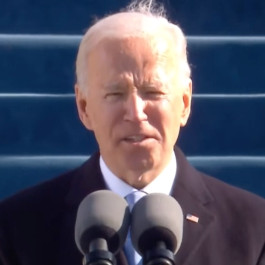
U.S. Back in Paris Agreement
View the page for this story
On his first day in office, President Biden recommitted the United States to the Paris Climate Accord. Jennifer Morgan, Executive Director of Greenpeace International, joins Host Steve Curwood to discuss the actions the United States must take to get back on track with the Paris climate plan, after four years of turning its back on climate diplomacy. (11:59)
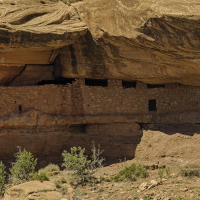
Biden Reverses Trump Rollbacks
View the page for this story
Hours after taking the oath of office, President Biden signed executive orders restoring environmental protections removed by his predecessor. Steve Curwood and Bobby Bascomb take stock of his first executive actions and put them in context. And with narrow Democratic control of Congress, President Biden and his party could also make use of the Congressional Review Act to quickly undo recent Trump administration rules. Romany Webb of the Sabin Center for Climate Change Law at Columbia University joins Host Steve Curwood to discuss the appeal and perils of using this tool. (09:39)
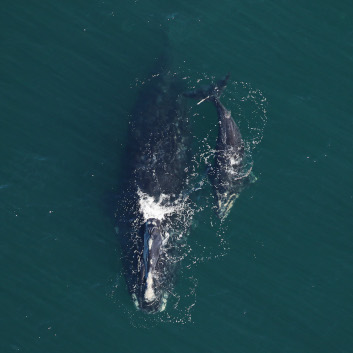
Little Time Left to Save Right Whales
View the page for this story
The North Atlantic right whale is one of the world's most endangered species, and ship strikes and entanglement in fishing nets threaten its survival. After years of petitioning the National Marine Fisheries Service to little avail, environmental organizations have filed a lawsuit to compel the agency to expand protections for the whales. Kristen Monsell, senior attorney for the Center for Biological Diversity, spoke with Host Bobby Bascomb about what’s needed to save the species. (08:34)
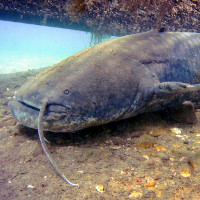
Beyond the Headlines
/ Peter DykstraView the page for this story
In this week's trip beyond the headlines, Host Bobby Bascomb and Environmental Health Weekend News Editor Peter Dykstra take a look at a giant, pigeon-eating European catfish, before turning to the topic of clean energy job loss in the United States. (03:01)

Ubuntu and Unity for Healing
View the page for this story
At his inauguration on January 20th Joe Biden called for unity at a time when America faces multiple crises. For a model of unity, Mr. Biden might look to the African concept of Ubuntu as a way to heal the many broken relationships in America. South African physician and anti-apartheid activist Mamphela Ramphele speaks with Steve Curwood about how Ubuntu can bring communities together and support individuals at the same time. (13:56)
Show Credits and Funders
Show Transcript
210122 Transcript
HOSTS: Bobby Bascomb, Steve Curwood
GUESTS: Kristen Monsell, Jennifer Morgan, Mamphela Ramphele, Romany Webb
REPORTERS: Peter Dykstra
[THEME]
CURWOOD: From PRX – this is Living On Earth.
[THEME]
CURWOOD: I’m Steve Curwood.
BASCOMB: And I’m Bobby Bascomb
The US now wants back in the Paris Climate Agreement, but the world is different.
MORGAN: They have a tremendous chance Biden and Harris to bring their environmental justice and racial justice agenda on the domestic level into the international agenda, and engage much more constructively taking care of those that are being impacted by emissions that came out of the United States.
CURWOOD: Also, lawsuits and urgent pleas to protect critically endangered Northern right whales.
MONSELL: While the situation is really dire right now we can save these animals. We know what needs to be done. We just need the political will to do so and are very hopeful that with the Biden administration the tide will start turning for right whales.
CURWOOD: Those stories this week on Living on Earth – Stick Around!
[NEWSBREAK MUSIC: Boards Of Canada “Zoetrope” from “In A Beautiful Place Out In The Country” (Warp Records 2000)]
[THEME]
U.S. Back in Paris Agreement
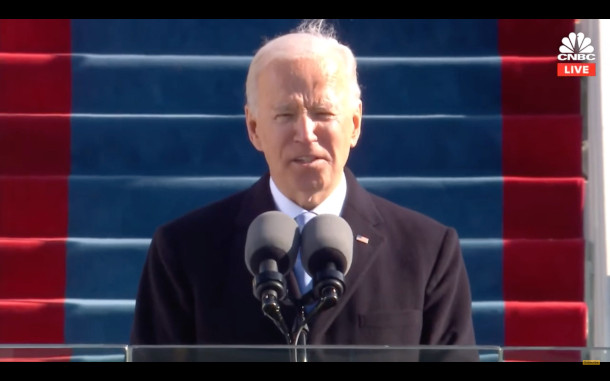
President Joe Biden at his inauguration ceremony January 20, 2021 at the Capitol Building in Washington D.C. (Photo: Screenshot of Presidential Inauguration)
BASCOMB: From PRX and the Jennifer and Ted Stanley Studios at the University of Massachusetts Boston, this is Living on Earth. I’m Bobby Bascomb.
CURWOOD: And I’m Steve Curwood.
Well, the US is now headed back into the Paris Climate Agreement thanks to a letter President Biden sent on the afternoon of his inauguration. It was among a dozen executive actions and orders, including many aimed at reversing former President Trump’s environmental rollbacks. But time, the climate emergency and the world have moved on, and the US can’t simply re-engage using the old Obama Administration playbook. Joining us now from Berlin, Germany to talk about what this means for global climate progress is Jennifer Morgan, former climate advisor to the German government and the executive director of Greenpeace International. Welcome back to Living on Earth, Jennifer!
MORGAN: Thanks. Great to be here.
CURWOOD: So now that the United States has sent that letter requesting to rejoin the Paris Climate Accord, what should it start working on right away?
MORGAN: Well, the first thing it needs to work on is what it's going to do domestically in the United States, to both reduce the emissions that cause climate change but also bring a lot of benefits along with that including new jobs, clean air. So that means investing in renewable energy. That means getting any recovery package that comes in to deal with the horrible COVID crisis to be going towards zero carbon emissions, laying the groundwork for that kind of infrastructure. That also means though stepping up and supporting the most vulnerable countries in the world that are suffering already from the impacts through aid, through capacity building, through technology transfer and really putting science at the middle of all of it.
CURWOOD: So technically, the US only came out of the Paris Climate Agreement in November, but de facto of course former President Trump pretty much sat on his hands for the past four years. What opportunities has the US missed in terms of the international negotiations as well as things that we could do at home over these past four years?
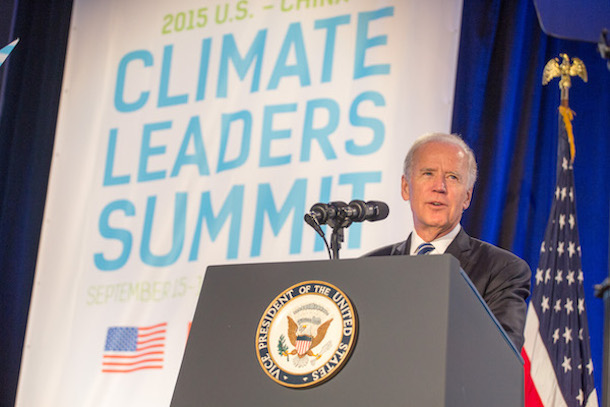
President Joe Biden during the 2015 Climate Leaders Summit. (Photo: Courtesy of the Biden-Harris Climate Task Force)
MORGAN: They've missed quite a lot. I mean, I think as far as really countries that are moving forward to solve problems together for example you know dealing with the impacts of climate change themselves. So adapting to those impacts, and knowing how to do that in a way that takes care of the most vulnerable communities in their countries. They've missed a lot of the you know parts of the renewable energy boom, which again, is around self sufficiency, energy independence in countries where you just have seen renewables now competing or out beating fossil fuels in many countries around the world. I think they've also really missed a sense of collaboration that's moved forward that had to, because it wasn't only that the former Trump administration was not wanting to move along. They were opposing it all along the way. So there's a sense of solidarity. And I think that the administration now needs to re-enter that whole area with some humility, because others had to move forward. They couldn't wait and did not do the extent that was needed, but certainly quite a bit.
CURWOOD: Drill down for me for a bit about some of the damage that was done so far by the United States leaving the Paris Climate Agreement?
MORGAN: Well, for one, I mean, I think there's two areas there. One is that it just makes things much harder. So if you have a White House, or you have a chancellery or you have a prime minister that is leading and moving forward in, for example, removing fossil fuels from different financing industry, banks, you know, whether it be the World Bank, or whether it be bilateral banks. Then you can move quickly together on that, versus if you have someone that's trying to pull you back the whole time. I think the other area is that the former Trump administration gave a lot of cover for those other countries that also that wanted to pull back Brazil, for example, on Bolsonaro, or the Russians, for example, or Saudi Arabia. And that, again, is kind of it was more like moving through mud, to make progress, rather than being on that, you know, sustainable astroturf.
CURWOOD: What about some of the financing that's part of the UN process here? What promises had the US made in the past for financing climate change research, helping with adaptation and such do we need to play catch up with now?
MORGAN: The US definitely has to play catch up, I think both in funding that it had committed to the Green Climate Fund, which is the fund that was created in order to support poor and developing countries both in dealing with the impacts and adapting to climate change and to moving forward and implementing solutions. You know, you had a whole effort that was underway in the research field not only to fund research, but also to allow scientists to do their job and not stop them from doing their job. I think, you know, another area there really also that is not necessarily part of Paris, but kind of which is around financial regulation. You know, we can't have just voluntary initiatives anymore of banks committing not to fund this or that we need a financial system that actually treats climate risk and potential stranded assets as a material risk, and regulates around that. And I think that's another area where the US is gonna have to play some catchup but can certainly play a really important leadership role Under Secretary Yellen.
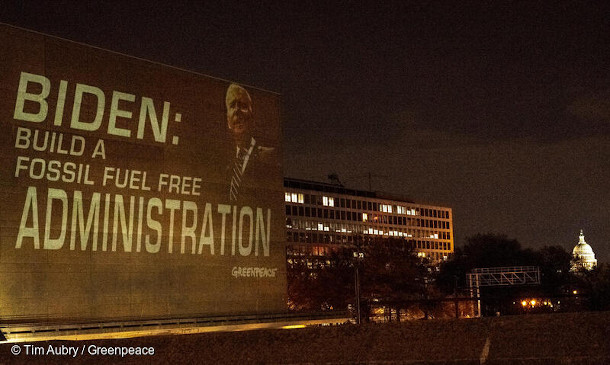
The Biden Administration has promised to lead the United States towards a path of a 100% clean energy and net zero emissions economy by the year 2050. (Photo: Tim Aubrey, Greenpeace)
CURWOOD: So the advent of the Biden administration takes us back in some respects more than a decade to the advent of the Obama administration, with a major climate talk coming up. For Obama, it was Copenhagen this year, we'll see a major set of talks in Glasgow. The Obama administration never put together a task force for all the federal agencies and such to figure out what to do at Copenhagen. What advice if any, do you have for the Biden administration to prepare for the upcoming session at Glasgow?
MORGAN: Well, I think this is going to be a very important meeting, my advice would be to take the approach that they're doing on the national level, which is to have it across all the different agencies from transportation to interior to you know, energy, obviously, and through special envoy Kerry do that on the global level. So that it's not only them bringing, which is a precondition, a much stronger reduction target for the US to bring back into the Paris Agreement but it is also about bringing climate and for example, removing away from fossil fuels into all of US foreign policy. And I think going into Glasgow, it's not just a one off meeting, it's really the moment I think, for world leaders to demonstrate that they're about the well being of people and the planet over this short term economic growth. And I think they have a tremendous chance Biden and Harris to bring their environmental justice and racial justice agenda on the domestic level, into the international agenda. Oftentimes in the United States, but also around the world, you see polluting industries, fossil fuel development happening in low income, often people of color communities and that needs to obviously stop. And those communities need to have the funds to help restore. On the global level, think about a small island, think about a small farmer in Africa that is suffering from drought and has no longer any kind of income, and oftentimes will then migrate and contribute to conflict somewhere else. What is the responsibility of the United States and I would even say, the companies of the United States that have caused so many of these emissions to taking care of those people, and certainly not their fault, they had nothing to do with the problems that are being solved. But the US is a key player and taking care of those people and that's known as dealing with their loss and their damages.
CURWOOD: So let's look across the international environment and tell me how you think that folks in that community are responding now to the United States, getting back into the Paris Climate Agreement? And what kind of position rather than trying to be seen as just a as a leader? Should the United States be trying to position itself as?
MORGAN: Well, I think I mean, I can't tell you how, like it was like a collective sigh of massive relief of the fact that you have moved from a climate denier White House to an administration that has said that climate is one of four priorities moving forward, I think that people are curious countries are curious of how the US is going to reengage in this, they will look for that credibility on domestic action and transforming the US economy. And I think they would say to this administration the world is different than it was four years ago. And they're ready for partnership with the US but also noting that the US can learn a lot from other countries right now and what they've been through. In you know, the European Union, although it's not as strong as it should be on the science has a Green Deal. It is moving forward and moving to a zero carbon economy. So a readiness though, a readiness, a curiosity, but also a bit of not trepidation, but just, you know, nervousness of, of a US that comes with exceptionalism, when actually I think the US needs to show a lot of humility right now.
CURWOOD: By the way, what's going to be the toughest opposition for the United States getting back into the international climate agreements not just at home, but abroad?
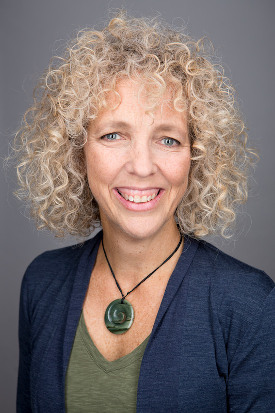
Jennifer Morgan is the executive director for Greenpeace International. (Photo: Bas Beenties, Greenpeace)
MORGAN: Opposition abroad, I think will come depending on what the US what the Biden Harris administration does at home. So I think there will be opposition if the administration were to re enter and start to kind of tell others or encourage others to do more when it hasn't done its own work at home. I think there'll be opposition coming from the most vulnerable countries looking for the support coming from the US, even kind of the back payments of what the US hasn't yet paid. And, you know, if the US and the Biden administration is really driving the way that they are saying then then maybe they'll even see some opposition from some of the former Trump allies like the Saudi Arabians or the Russians because optimally, this administration needs to be driving the world away from fossil fuels in every single way that it can, as quickly as it can. And so a measure of what success would be that the opposition would be coming from those fossil fuel producers.
CURWOOD: And just to be clear, the three largest exporters of liquid hydrocarbons in the world are Saudi Arabia, Russia and the United States of America. There's a distance to go there politically for the US. How does the US get there?
MORGAN: There is a distance to go and I think it's the US gets there by setting a pathway for the phase out of fossil fuels, providing a just transition for workers that are currently in that sphere, ramping up their work on other solutions, working with communities to do that, and doing that together in a unifying way. And I think there's no choice now the science is so clear we have so little time. And so it's that kind of joint work and collaboration with that set goal that I think the US could provide some leadership on.
CURWOOD: Jennifer Morgan is the executive director of Greenpeace International. Thanks so much for taking the time with us today, Jennifer.
MORGAN: Great to be here.
Related links:
- Click here to watch the inauguration of President Joe Biden and Vice President Kamala Harris
- New York Times | “Biden Cancels Keystone XL Pipeline and Rejoins Paris Climate Agreement”
- Read more on the United Nations Climate Change Platform
- Learn more about the Biden-Harris climate task force
[MUSIC: The Funky Knuckles, “Wise Willis” on New Birth, GroundUP Music LLC.]
BASCOMB: Coming up – How President Biden is reversing Trump administration climate and environmental rollbacks. That’s just ahead on Living on Earth.
ANNOUNCER: Support for Living on Earth comes from Sailors for the Sea and Oceana. Helping boaters race clean, sail green and protect the seas they love. More information at sailors for the sea dot org.
[CUTAWAY MUSIC: Brad Mehldau Teio, “Bee Blues” on Ode, Nonesuch Records Inc.]
Biden Reverses Trump Rollbacks
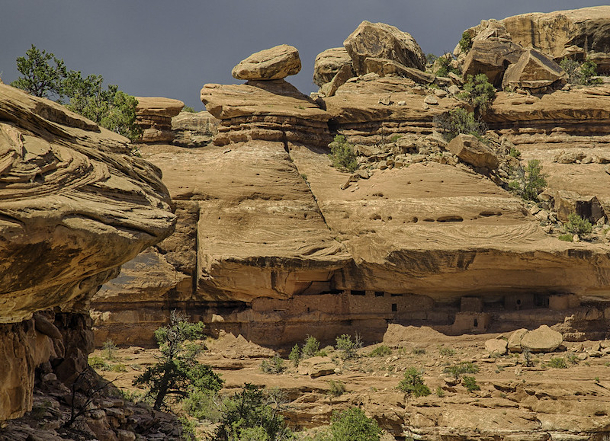
President Biden immediately signed an executive order that directs many actions including reviewing the option to restore Bears Ears National Monument, which former President Trump reduced in size by 85%. The dramatic desert landscape is home to abundant rock art, ceremonial kivas, and ancient cliff dwellings including Moon House, above. (Photo: Bob Wick / BLM, Flickr, CC BY 2.0)
CURWOOD: It’s Living on Earth, I’m Steve Curwood.
BASCOMB: And I’m Bobby Bascomb.
So, Steve, re-joining the Paris agreement is a huge step forward for the United States to get back on track when it comes to working with the international community to tackle climate change.
CURWOOD: It most certainly is, and President Biden has been wearing out his pen since the 20th on domestic environmental issues as well, undoing much of former President Trump’s environmental damage. I understand you’ve been looking into some of those actions for us Bobby.
BASCOMB: Yeah I have! Shortly after the inauguration Joe Biden signed more than a dozen executive orders, several of them about the environment. Among them, he directed the Interior Department to review the boundaries for several national monuments that were shrunk by the Trump administration.
CURWOOD: Oh, yeah. I mean famously, the Bears Ears national monument was made about 85 percent smaller to allow uranium mining and drilling for oil and gas.
BASCOMB: Right, President Biden has said all along that he wants to put a halt to new oil and gas leases on public lands and he took a first step towards that by placing a temporary moratorium on oil and gas leases in the Arctic National Wildlife Refuge. And Mr. Biden cancelled the permit for the Keystone XL pipeline.

A temporary moratorium on oil and gas leasing in the Arctic National Wildlife Refuge was among President Biden’s many first-day actions. (Photo: Danielle Brigida, Flickr, CC BY 2.0)
CURWOOD: That’s been a political football for a decade. Protestors even went to jail in a bid to get President Obama to kill it. Those activists said that burning all the carbon-heavy tar sands oil that would be transported by Keystone XL would mean game over for the climate if we were to allow the pipeline to move forward.
BASCOMB: And Native American groups have been protesting it since day one, they’re concerned that a spill could damage in ecologically sensitive and culturally sacred areas along the route from Alberta, Canada to refineries on the Gulf Coast. So, President Obama eventually rejected the pipeline only to have President Trump give it the green light, he said it was important for the economy and job creation, again reviving the controversy. It got bogged down in court battles and with all the delays now it’s not a huge priority for the oil industry, given the low cost of a barrel of oil today. So, to some degree you could argue that this is a symbolic gesture by President Biden, but he is certainly signaling his intention to take the issue of climate change seriously.
CURWOOD: Yeah, and he says that he wants the US to be carbon neutral by the year 2050.
BASCOMB: Exactly, it’s such an ambitious goal. But to help us get there he issued another executive order telling federal agencies to look again at methane rules and fuel and building efficiency standards.
CURWOOD: Yeah and so, maybe an end to the standoff with California about their stricter fuel efficiency standards for cars?
BASCOMB: Probably so, yes.
CURWOOD: Yeah but still, I feel like we’ve spent the last four years reporting on the dozens of environmental laws and regulations that former President Trump rolled back or weakened. Mr. Biden and his team are going to be very busy!
BASCOMB: Oh gosh they certainly are. And you’re right, the total number is more than 100. But with a stroke of that pen back on inauguration day President Biden also moved to reconsider Trump rules that quote “were harmful to public health, damaging to the environment or unsupported by the best available science.” So, I think we can expect the new administration to move quickly to address the climate and the environment, more broadly. Of course, changing the rules for federal agencies can and often does take years. But, there is another way, the Congressional Review Act. It allows a simple majority in Congress and approval by the president to void rules that have been completed during the last sixty legislative days of a previous presidential term, and Steve and you’ve been looking into this for us right?

Climate activists have been battling the Keystone XL pipeline for over a decade, and President Biden revoked its permit on his first day in office. (Photo: chesapeakeclimate, Flickr, CC BY-SA 2.0)
CURWOOD: Yes, Some possible targets are some last-minute Trump Administration rules that cut food stamps for some 3 million people and another that exempts the USDA from certain environmental reviews that could promote increased logging in national forests. And then there’s the widely criticized so-called ‘transparency in science’ regulation, adopted just a few weeks ago by the Trump EPA. Now this deceptively named rule would force researchers to disclose confidential medical data used to study health effects of pollution and toxics. But there is a risk, as rules are taken off the books by Congress can’t be reinstated in “substantially the same form,” and that can tie agency hands in the future. So for more, I want to turn now to Romany Webb, Senior Fellow at the Sabin Center for Climate Change Law at Columbia University. Welcome to Living on Earth Romany!
WEBB: Thank you. It's nice to be here.
CURWOOD: Now Romany, the so-called "transparency in science" rule, also known as the "secret science" rule, was finished by the EPA just a few weeks ago. Why is this rule getting so much attention as a possible target for the Congressional Review Act?
WEBB: Yeah, so the inaptly-named science transparency rule, what it actually does is restricts the Environmental Protection Agency's ability to rely on scientific studies where the underlying data is not publicly available. And to the layperson, that might not sound so bad, but a lot of the studies that EPA relies on of course are public health studies, where the underlying data is confidential medical information that simply can't be disclosed. So it would really restrict the type of studies that the EPA can rely on and has relied on in the past to adopt some of our most important air pollution controls and other regulations. You know, this adoption of the secret science rule or the science transparency rule really generated a lot of controversy for that reason, it's very unpopular amongst environmental organizations and other sort of science advocacy groups. And so definitely, that is one that's being talked about as a possible target for disapproval through the CRA process. It's very unlikely that a Biden administration or even another Democratic administration would want to adopt a rule like the science transparency rule. So, you know, that "substantially similar" language is less of an issue there.
CURWOOD: And while it was named science transparency, some consider this a science inhibition rule in particular, for years industry has contested the health effects of particulates, trying to get at databases where people had given up their health records to demonstrate how deadly particulates are. EPA I believe made some findings ignoring a number of studies that in fact had confidential medical data in them. So this is kind of a big deal.

In the last days of the Trump Administration, the EPA imposed a 3% threshold for regulating greenhouse gas sources that would ignore emissions from the oil and gas sector, which accounts for 2.5% of U.S. greenhouse gases. In fact, the only industrial sector above the 3% threshold is the electric power generation sector. (Photo: WildEarth Guardians, Flickr, CC BY-NC-ND 2.0)
WEBB: Yeah, definitely. And the EPA rule, the science transparency rule or the secret science rule, does not come out of nowhere. This is a rule that actually Congress tried to legislate this requirement, tried to enact legislation that would impose this requirement on EPA multiple times in the past, all of those measures were unsuccessful. And so now that the Trump administration has had control of the EPA, they've decided to do it through an agency rule making process.
CURWOOD: So there's a new rule that the now-vanished Trump administration had put forward that set a 3% threshold for regulating industrial sources under the Clean Air Act. In other words, exempting many, many, many industries, because no one industry is so huge. How might the Congressional Review Act be used to get rid of that?
WEBB: Yeah, the rule you're talking about establishing the 3% threshold really means that only the electric generating sector can be regulated by EPA, under the new source performance standards, the section 111(b) and (d) process. So it effectively excludes from regulation all those other big sources of emissions that fall just below the threshold, so the oil and gas sector, which is upwards of 2.5%, but just doesn't quite make it to 3%, and many others. So there is, you know, some talk that the Congressional Review Act could be used to disapprove of that rule. You know, this "substantially similar" provision, the prohibition on adopting substantially similar rules, is giving some people pause in terms of what that would mean, if this rule establishing the 3% threshold was disapproved through the CRA process, might that limit the adoption of other regulations that future Democratic administrations want to adopt? So that one, I think, is less of a slam dunk than the science transparency rule.
CURWOOD: Now what about the rule that came out of the Trump administration that essentially set financial cost-benefit analysis for cleaning up the air and pretty much ignored co-benefits such as, you know, health benefits, saving lives? There's some effort to get this repealed, I understand.
WEBB: Yeah, I think the cost-benefit analysis rule that was finalized by EPA relatively recently is one that is certainly getting attention for potential review under the CRA. You know, it has been incredibly controversial and, and widely disparaged on the basis that it does prevent consideration of co-benefits, which are a key benefit of many of our rules, and have played an important part in the basis on which many of our rules have been adopted.
CURWOOD: And in fact, doesn't in a way contradict the Clean Air Act itself, which says that strictly cost-benefit is not applicable, or should not be paramount when there are health considerations?
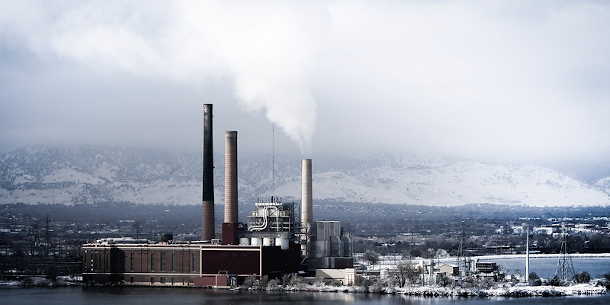
Another recently adopted EPA rule directs the agency to ignore co-benefits such as lives saved by reducing air pollution. (Photo: CAJC: in the PNW, Flickr, CC BY-NC-ND 2.0)
WEBB: Yeah, I mean, there's, you know, quite complicated rules around how economic considerations should factor into rules adopted under the Clean Air Act. Certainly the Clean Air Act is not solely an economic statute, and it's not intended to be one. The agency cannot solely consider economic factors and in some cases is prevented from considering economic factors when adopting rules. So, you know, this attempt by the Trump administration to further inject economic factors into decision making, but to restrict the nature of those factors that can be considered is problematic on multiple fronts.
CURWOOD: Romany Webb is a Senior Fellow at the Sabin Center for Climate Change Law at Columbia University. Romany, thanks so much for taking the time with us today.
WEBB: Thanks, Steve.
Related links:
- Whitehouse.gov: Executive Order on Protecting Public Health and the Environment and Restoring Science to Tackle the Climate Crisis
- Columbia’s Sabin Center: “Climate Reregulation in a Biden Administration”
- NRDC: Read about the long battle against the Keystone XL pipeline
- The Sabin Center’s Climate Deregulation Tracker
- The Sabin Center now has a Climate RE-Regulation Tracker
- Slate | “Democrats Have a Filibuster-Proof Tool to Erase the Trump Administration’s Final Months”
- About Romany Webb
[MUSIC: Jacob Christoffersen Trio, “We Want You” on Stunt Records Compilation Vol 25, by J. Christoffersen, Sundance Music]
Little Time Left to Save Right Whales
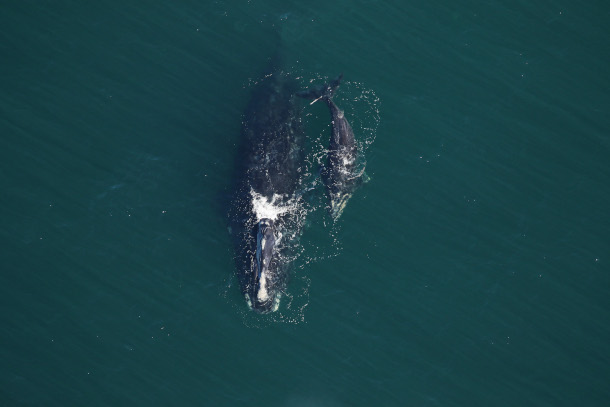
There are less than 400 Northern Atlantic Right whales left and no more than 100 breeding females. (Photo: Clearwater Marine Aquarium Research Institute, FWC Fish and Wildlife research Institute, Flickr, CC by NC ND 2.0)
BASCOMB: Conservation groups recently filed an emergency rule-making petition asking the US government to expand protections for North Atlantic Right whales. Once hunted to near extinction, right whales supposedly came by their name because they were the right whale to hunt. They move slowly through the water and tend to float once killed instead of sink like most whales, making them easy to retrieve for their blubber and meat. Once hunting was banned in 1935 the population of right whales began to slowly bounce back, but today the population is again in free fall. Ship strikes and entanglement in fishing gear are killing more right whales each year than are being born. Less than 400 of these giant marine mammals remain, making them a critically endangered species. For more I’m joined now by Kristen Monsell, a senior attorney for the Center for Biological Diversity, one of the groups petitioning the National Marine Fisheries Service for added protections for right whales. Welcome to Living on Earth Kristen!
MONSELL: Thank you happy to be here.
BASCOMB: The Center for Biological Diversity along with other conservation groups has filed a lawsuit against the government asking for the protection of Northern Atlantic right whales. What actions are you arguing for in this lawsuit and how will it actually help the species?
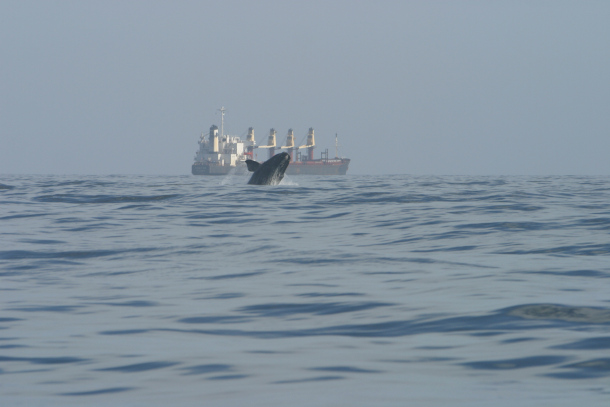
These Atlantic coastal waters are part of a network of Seasonal Management Areas (SMA) implemented by NOAA Fisheries to reduce the likelihood of deaths and serious injuries to these endangered whales that result from collisions with ships. (Photo: Florida Fish and Wildlife Conservation Commission, NOAA Research, FWC Fish and Wildlife Research Institute, Flickr, CC BY-NC-ND 2.0)
MONSELL: One lawsuit is about vessel strikes. So vessel collisions can kill or injure right whales in a few different ways. One through blunt force trauma that can result in fractures or blood clots or hemorrhages. Another is through direct propeller strikes that can result in blood loss, lacerations or amputations. But science tells us that when ships slow down to 10 knots or less, they are much less likely to kill a right whale. And the agency has a rule in place right now that requires vessels over 65 feet in length to slow down in certain areas at certain times of year to prevent right whales from getting run over and killed by ships. And we petitioned the agency in 2012, to expand the scope of that rule so that it applies in more areas, and that it applies to smaller vessels, because there is situations in which right whales were struck by much smaller vessels. And the agency has never responded to our petition despite a host of evidence indicating that the rule, while it's effective in the places and times that it applies it's not effective enough, it needs to be expanded both in time and space and to the vessels that it applies to.
BASCOMB: And how difficult of a sell is this for the fishing industry or the commercial shipping industry that travels in this area? How would reducing speed limits impact the boats that are going through there?
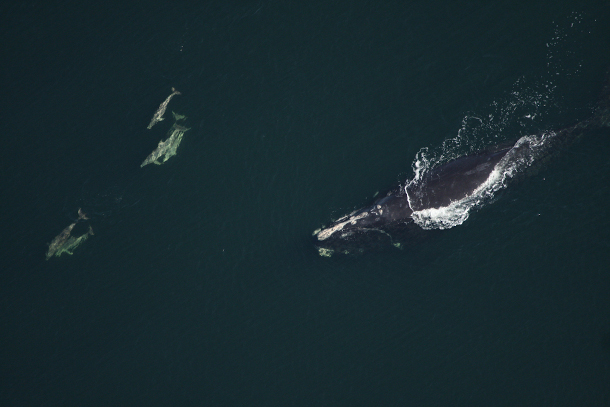
This right whale was photographed with a small pod of bottlenose dolphins, common in nearshore Florida waters. (Photo: Florida Fish and Wildlife Conservation Commission, NOAA Research, FWC Fish and Wildlife Research Institute, Flickr, CC BY-NC-ND 2.0)
MONSELL: The shipping industry didn't like the rule when it was originally enacted in part because they claim it would result in a significant economic burden on the industry. But we know since reports that have been issued since the rule went into effect to that the impact was much less significant than they had claimed it would be. There's also an exemption in the rule in the interest of safety if the captain of the boat thinks that it would endanger his or her crew to slow down in a particular area because of ocean conditions or other factors. They don't have to slow down. And, you know, frankly, I think we can't afford not to enact these protections because if we don't we really risk losing the species forever and whales provide incredible benefits to the ocean and our planet as a whole. For example, their poop is incredibly nutrient rich, it helps to fertilize phytoplankton, which are the base of the food chain and the whales really do sow the seeds of healthy ecosystems. And in addition, they also act as carbon sinks. whales accumulate lots of carbon in their bodies during their lives and when they die, they sink to the bottom of the ocean taking all that carbon with them. So we really risk significant disruption to the ocean ecosystem if we we don't save these species.
BASCOMB: So ship strikes are the obvious and acute problem for right whales right now that you're trying to address. But of course, there are a lot of problems in the world's oceans. Can you tell me please about some of the other challenges facing right whales and how this potential change in boating speed would factor into the bigger problems facing their habitat as a whole?
MORGAN: Right whales are unfortunately facing a slew of problems including entanglement in fishing gear. And that's another issue that we are trying to tackle through a variety of means including both the courts and administrative petitions to the National Marine Fisheries Service. And like ship strikes, there are very common sense measures that the agency can take to help protect these animals from getting tangled up and seriously injured or killed in commercial fishing gear, including closing important right whale habitat areas, to vertical lines and promoting the transition to rope less fishing gear, which is a type of gear that has no static vertical line running through the water column only during active retrieval would there be any vertical line so you essentially eliminate the risk of entanglement by eliminating the rope in the water. Which is something that we're, we're pushing for.
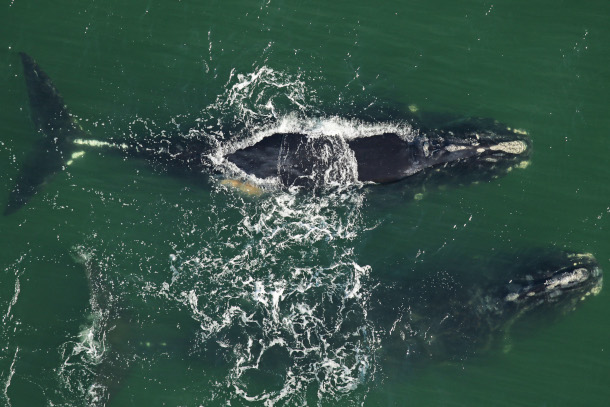
Two potential calving females. The top whale in this photo has a large propeller scar on her right side from a vessel strike. Although she survived this vessel strike, the scar may become problematic during pregnancy as her body expands to accommodate the growing calf. (Photo: FWC Fish and Wildlife, FWC Fish and Wildlife Research Institute, Flickr, CC BY-NC-ND 2.0)
BASCOMB: And how is climate change affecting the whales? I mean, that's a much bigger problem, obviously.
MONSELL: Yes, it is. A lot of the problems right whales are facing now are in part due to climate change and warming waters that are shifting where their prey is. So, we're seeing right whales go into habitat areas where they haven't traditionally been found. So, there are no protections in place in those particular waters, which is increasing their rate of entanglement. And one of the effects of that has been that there are now significantly longer calving intervals. So, the time period between when you know one whale gives birth to a baby right whale and then does it a second time. A healthy right whale will have a calving interval of about three years now that calving interval is up to about ten years, which is another reason why this species is doing so poorly.
BASCOMB: Gosh, so many challenges for them. It's, it seems really overwhelming and daunting, I should think.
MONSELL: It is but you know, these whales are resilient. They came back from the brink of extinction once we stopped hunting them. And they can do that again provided we stopped running them over with ships and entangling them in fishing gear.
BASCOMB: Well, right now, what are the long-term survival projections for right whales?
MONSELL: Sadly, it's not looking good right now. Scientists estimate that if current trends continue the species could be functionally extinct within the next 20 years. While the situation is really dire right now, we can save these animals. We know what needs to be done. We just need the political will to do so and are very hopeful that with the Biden administration coming in the tide will start turning for right whales and we'll see the population increase again rather than the significant unsustainable decline we're seeing right now.
BASCOMB: Kristen Monsell is a senior attorney with the Center for Biological Diversity. Kristen, thank you so much for taking this time with me today.
MONSELL: Sure, no problem.
Related links:
- Conservation Law Foundation | “Groups Sue Feds to Protect Endangered North Atlantic Right Whales from Vessel Strikes”
- NRDC | “What’s Happening to the North Atlantic Right Whale Is Just Plain Wrong”
- Daily Hampshire Gazette | “Lawsuit Seeks More Protection for Right Whales”
- Learn more about the origins of the term right whale
- Read the emergency petition filed in 2020 by the Center for Biological Diversity to protect Atlantic right whales
[MUSIC: Paul Winter, “Lullaby From the Great Mother Whale For the Baby Seal Pups,” on Callings: A Celebration Of Voices From the Sea, by Paul Winter, Living Music]
CURWOOD: Coming up – Some ancient African wisdom on bringing people closer to each other and to their environment. That’s just ahead on Living on Earth.
ANNOUNCER: Funding for Living on Earth comes from you, our listeners, and United Technologies, combining a passion for science with engineering to create solutions designed for sustainability in aerospace, building industries, and food refrigeration.
[CUTAWAY MUSIC: Medeski, Martin & Wood, “Shine It” on End Of The World Party (Just In Case)]
Beyond the Headlines
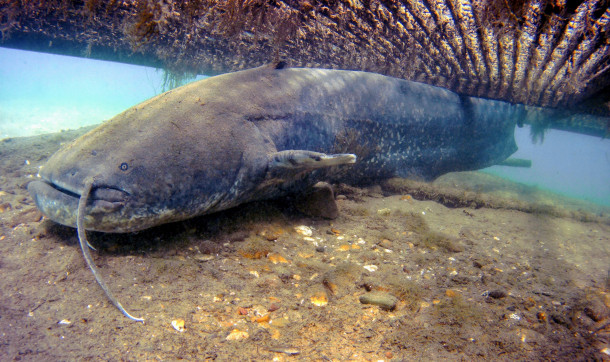
The wels catfish often grow to a size of 6 feet and a weight of 140lbs, but some scientists speculate that they can grow to over twice that size. (Photo: Craebby Crabbson, Flickr, CC BY-NC 2.0)
CURWOOD: It’s Living on Earth. I’m Steve Curwood.
BASCOMB: And I’m Bobby Bascomb.
Well, it's time for a trip beyond the headlines with Peter Dykstra. Peter's an editor with Environmental Health News. That's EHN.org and DailyClimate.org. Hey there, Peter, what do you have for us this week?
DYKSTRA: Well, hi, Bobby. As you know, every once in a while we get an invasive species story that sounds like it's straight out of either the cartoons, or the sci-fi world. Well, in this country, we've got the Asian carp, you may have seen video of these 10 or 20 pound fish who breach way clear out of the water, because they go crazy when they hear boat noise. And getting hit by a 10 or 20 pound fish coming out of the water can be memorable. Maybe even more memorable; in Europe, there are catfish species that can weigh up to 600 pounds.
BASCOMB: Oh my goodness.
DYKSTRA: These are enormous catfish, and they've perfected a technique to sort of lay out in the sandbar, half in the water, half out of the water and wait to pounce on an unsuspecting pigeon. Yeah, I'm talking about fish eating birds, not birds eating fish. That's gotta be concerning for the pigeons, although having lived in cities for a good part of my life, I've really got no qualms if an animal wants to eat a few more urban pigeons. But when you have that big an animal come in as an apex predator at the top of the food chain, things can not go well for the local ecosystem.
BASCOMB: Well, what else do you have for us this week?
DYKSTRA: An analysis by the BW Research Partnership, conducted on behalf of several clean energy advocacy groups, links the COVID pandemic to the loss of 400,000 clean energy jobs. That's 12% of the Clean Energy workforce. And those jobs have all been lost since the month of March.

Clean energy jobs have previously been one of the fastest-growing industries in the United Sates, but the COVID-19 pandemic led to many clean energy workers losing their jobs. (Photo: Oregon Department of Transportation, CC BY 2.0)
BASCOMB: Wow, that's a lot of clean energy jobs. I mean, before the COVID outbreak, we were hearing that the renewable energy sector was one of the fastest growing job sectors in the US economy. What happened here?
DYKSTRA: Well, like so many sectors of the US economy, it just crashed to the bottom. Most of those 400,000 jobs, about three quarters of them are in energy efficiency, retrofits and the like, that are generally regarded by a lot of people as optional things and when the economy is on the edge of collapse, you tend not to do the optional things. There are other job losses in wind farms, solar farms, and a lot more. And the BW Research Partnership says that we may not see full recovery in the clean energy sector until the year 2023.
BASCOMB: Hmm, well, like so much of our economy, it's gonna take some time to bounce back. Peter Dykstra is an editor with Environmental Health News. That's EHN.org and DailyClimate.org. We'll talk to you again soon, Peter.
DYKSTRA: Okay, Bobby, thanks a lot. Talk to you soon.
BASCOMB: Thank you. And there's more any stories on the Living on Earth website, LOE.org.
Related links:
- National Geographic | “Enormous Pigeon-Eating Catfish Wreaking Havoc on Europe’s Ecosystems”
- Yale Environment 360 | “More Than 400,000 U.S. Clean Energy Jobs Have Been Lost So Far During the Pandemic”
[MUSIC: Terry Allen, “My Country ‘Tis Of Thee,” on Amerasia, Traditional/arr.Thomas Arne/arr.Terry Allen; lyrics by Samuel F. Smith, Sugar Hill Records]
Ubuntu and Unity for Healing
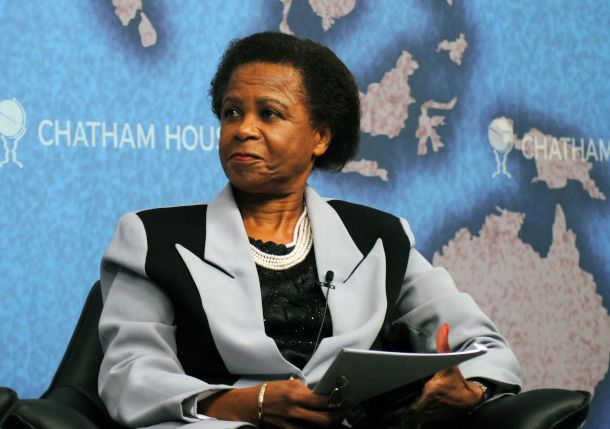
Dr. Mamphela Ramphele is a physician, activist, and founder of the Agang South Africa political party. (Photo: Wikimedia Commons, CC BY 2.0)
CURWOOD: History will likely recall Joe Biden’s speech at his inauguration on January 20th both for its inventory of America’s present woes and the challenging solution he called for.
PRESIDENT BIDEN: A cry for racial justice, some four hundred years in the making moves us. The dream of justice for all will be deferred no longer. A cry for survival comes from the planet itself, a cry that can’t be any more desperate or any more clear. And now a rise of political extremism, white supremacy, domestic terrorism that we must confront, and we will defeat. To overcome these challenges, to restore the soul and secure the future of America requires so much more than words. It requires the most elusive of all things in a democracy: unity, unity.
CURWOOD: For a model of unity Mr. Biden might look to the African concept of Ubuntu as a way to heal the many broken relationships in America. Writing in an essay for the book The New Possible, South African physician and anti-apartheid activist Mamphela Ramphele explains how Ubuntu can bring communities together and support individuals at the same time. Dr. Ramphele joins us now from Cape Town. Welcome to Living on Earth!
RAMPHELE: Thank you very much for having me, and greetings to your audience.
CURWOOD: So, what are the principles of Ubuntu, and why are you writing about it now?
RAMPHELE: The principles of Ubuntu are the original wisdom of all our common ancestors, because remember, all human beings originated here in Africa. And it is that wisdom that our ancestors began to understand that the only way they can not only survive, but thrive is by working together to relate to one another in a way that says: I am because you are. But also, they developed a very deep reverence for nature. So Ubuntu is not just about the interrelationships and interdependence between human beings, but also between human beings and all of nature's life.
CURWOOD: I am because you are.
RAMPHELE: Yes indeed.
CURWOOD: In a broader sense, what is this, "I am, because you are"?
RAMPHELE: When I say "I am, because you are" I am saying to you: I will do everything that I know you need to thrive so that you can do the same to me, because the best life insurance for any species in an ecosystem is contributing usefully to the well being of other living species.
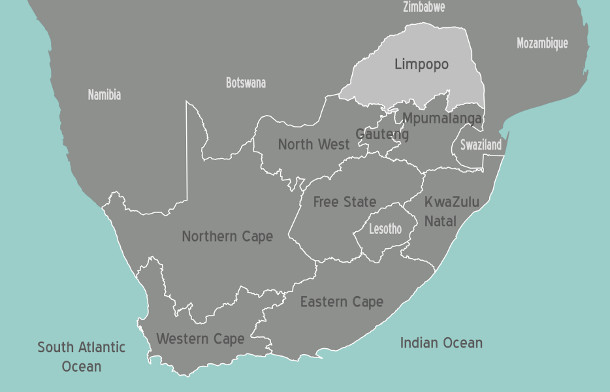
A map of South Africa, with Dr. Ramphele’s home province of Limpopo, highlighted in a lighter gray. (Photo: Wikimedia Commons, CC BY 1.0)
CURWOOD: In the essay that you wrote, you say that you learn the tenets of Ubuntu from your elders growing up in a rural South African village in the province of Limpopo, not too far from a lot of big animals over there at the National Park. What did it look like growing up in that community?
RAMPHELE: Absolutely idyllic. We were at the foot of the Soutpansberg Mountains, and we had a huge extended family. You were taught the values of Ubuntu, not by saying "you must do this, don't do that", but by being told, "no my dear child, a person does not do that". So not to live by the values of Ubuntu is defining yourself out of the family of human beings. And when you do something great, they say, "that's what a person does". So we were affirmed in this way of life, this philosophy of life, that was all encompassing. And so this is the beauty of multi generations growing up in the same household.
CURWOOD: So another way to summarize this perhaps is that looking through the lens of Ubuntu, there are no individuals, there's simply members.
RAMPHELE: There are individuals to the extent, and this is an important part, to the extent that you are recognized as a very unique being, with unique talents. And I was the tiniest, I could never do anything like run, but I was made to believe that, no, no, you have other things that you can contribute. And so my dad used to tell me, use your brain because you haven't got any physical abilities. So it wasn't that you were part of a collective that submerged your individuality, but you were taught that your talents and your individuality will thrive within this collective affirming Ubuntu network.
CURWOOD: Now, one key concept of Ubuntu is affirmation. What exactly is affirmation in this context?
RAMPHELE: Affirmation is respect for people because they are human. And that respect is exhibited by treating other people the way you want to be treated. And it also is recognized by neuroscientists today, that humiliation is the worst trauma you can visit upon another person. So as a nation is precisely to counter any suggestion of treating people in a way that humiliates them.
CURWOOD: And the impact of being humiliated is, as you say, devastating.
RAMPHELE: Absolutely devastating. Because unfortunately, one of the consequences of it is that the person humiliated loses self-respect, loses reverence for life. And because they are humiliated they won't attack the attacker, they tend to attack those closest to them, and they tend to attack people who look like them. And, of course, there is a lot of self mutilation that happens, whether through drugs or through other forms of self destruction.
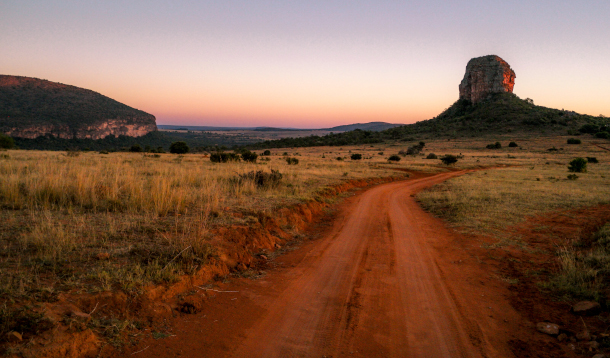
The Entabeni Game Reserve in Limpopo Province. (Photo: Fyre Mael, Flickr, CC-BY 2.0)
CURWOOD: Now, in your essay, you talk about how these things are passed from one generation to the next. How has humiliation had such an impact in Africa, and for that matter, in the United States for generation after generation. Who has been affected by this?
RAMPHELE: The trauma of humiliation visited upon ancestors those many years ago through slavery, and just bad treatment of other human beings gets patterned into our genetic makeup. Without today's generations having experienced it, it gets awakened by any traumatic event. It's like the memory is in our blood, in our genes. And when we meet a traumatic experience, we remember and we react as if we are the ones who have just been enslaved, or just been tortured. That pain endures from generation to generation, unless, as you say in my continent, or in my country, it is ritualized into a healing process.
CURWOOD: Dr. Ramphele, you are perhaps one of the world's most famous widows, if I can put it that way. The father of your children was Steve Biko, one of the leaders of the Soweto uprising that began in 1976. He was killed viciously by the police the next year. How did the uprising in Soweto, which of course was key to the change in South Africa, how did this embody Ubuntu?
RAMPHELE: Well, the uprising in Soweto was actually not led by Steve or any of my generation. What we did was to inspire young people to believe in themselves through the black consciousness movement. And that movement was simply saying: you are a beloved creature of God. No one has a right because of the color of your skin to treat you any less than you should be treated. But you have the power to not allow what other people think about you to govern you. And it is a free mind that is the first step to freedom. So you can be able to say "no" to your oppresser. And that's what happened with those young people in Soweto. Now, how does that tie up with Ubuntu? Of course, when we say I am black, and I'm proud, we are saying everybody, whatever the color, what matters is that you are human. We gave up on mimicry, and went back to our roots, re-embraced Ubuntu and allowed that to be a new way of being.
CURWOOD: So the principles of Ubuntu of course need to translate by culture to culture. How do you think Americans could adapt the principles of Ubuntu to our own problems?
RAMPHELE: The principles of Ubuntu are there in many cultures, and in many languages, you don't have to call it that. But what you have to do is to recognize that deep down in all of you is that inextricable connectedness. Seminal moments in your history in the USA, they were when you got together. Whether it's the March on Washington, or even sad occasions where you were burying your heroes. But also, when you celebrate the coming into office of a new president, that's when the highest positive energy is in your country. Let's learn from that.
CURWOOD: We've seen the beginning of the arrival of a set of vaccines that will allow humanity to better combat this pandemic. But of course, addressing the disease is only part of truly healing. What should the world be doing now to take advantage of how COVID has shown how perilous the human condition is, with our present set of behaviors?

The New Possible: Visions of Our World Beyond Crisis is a collection of 28 essays, including Mamphela Ramphele’s essay on Ubuntu. (Photo: Courtesy of Cascade Books)
RAMPHELE: I think COVID has opened our eyes to [the fact that] we cannot be healed, we cannot be well, unless the ecosystem in which we are in, including the human community, is well. What the vaccine does is to give us a little break and an opportunity for those who are particularly the frontline workers to be able to help those who are already affected. But for the rest of us, if we get immunity is not the end of COVID. What scientists say is that we are likely to see more and more of these break-ins from viruses that we have opened up their ecosystems by destroying the forest. We know that human beings and their immune systems function best when they feel loved, affirmed, and even in the poverty of material things. And so we now have an opportunity to reimagine a world where we see ourselves as part of nature. We are not saving nature, nature will save itself. We have to save ourselves from this existential crisis by changing fundamentally the way we live, how we relate to one another, and how we relate to the rest of life. And that's the opportunity we have.
CURWOOD: So before you go, Dr. Ramphele, what words of comfort or advice do you have for those of us who are the most vulnerable as the flames from COVID still rage?
RAMPHELE: First thing to remember is that we are in this together, and you are not alone. You may feel alone, but you are not alone. Your ancestors are with you. And those who are yet to be born from your line are with you. Second, you are venerable. You are important because you are such a unique creature, and your Creator is with you. Third, you have the ability to do what it takes to meet these challenges of today by stretching your hand across the fence to your neighbor to others around you so that you can lend a hand and they'll lend a hand. It is when we work together as families, as neighbors, as people working together, as nations, and as a global community that we actually get to overcome.
CURWOOD: South African physician and activist Mamphela Ramphele. Her essay on Ubuntu is in the book, The New Possible.
Related links:
- Click here for The New Possible book (Affiliate link helps donate to LOE and local indie bookstores)
- TED Blog | “I Am, Because Of You: Further Reading on Ubuntu”
- Mamphela Ramphele’s website
- TIME | “Soweto Uprising | 100 Photographs”
- Find other great books featured by LOE on Bookshop.org (Note: This is an affiliate link)
[MUSIC: John Williams and Friends, “Township Kwela” on The Magic Box, by Timothy Walker, Sony Classical]
CURWOOD: Living on Earth is produced by the World Media Foundation. Our crew includes Naomi Arenberg, Paloma Beltran, Grace Callahan, Jenni Doering, Jay Feinstein, Leah Jablo, Mark Seth Lender, Don Lyman, Aynsley O’Neill, Jake Rego, Casey Troost, and Jolanda Omari. We welcome our new intern Paige Greenfield.
BASCOMB: Tom Tiger engineered our show. Allison Lirish Dean composed our themes. You can hear us anytime at L-O-E dot org, Apple Podcasts and Google Podcasts, and like us, please, on our Facebook page - Living on Earth. We tweet from @livingonearth. And find us on Instagram at livingonearthradio. I’m Bobby Bascomb
CURWOOD: And I’m Steve Curwood. Thanks for listening!
ANNOUNCER: Funding for Living on Earth comes from you, our listeners, and from the University of Massachusetts, Boston, in association with its School for the Environment, developing the next generation of environmental leaders. And from the Grantham Foundation for the protection of the environment, supporting strategic communications and collaboration in solving the world’s most pressing environmental problems.
ANNOUNCER 2: PRX.
Living on Earth wants to hear from you!
Living on Earth
62 Calef Highway, Suite 212
Lee, NH 03861
Telephone: 617-287-4121
E-mail: comments@loe.org
Newsletter [Click here]
Donate to Living on Earth!
Living on Earth is an independent media program and relies entirely on contributions from listeners and institutions supporting public service. Please donate now to preserve an independent environmental voice.
NewsletterLiving on Earth offers a weekly delivery of the show's rundown to your mailbox. Sign up for our newsletter today!
 Sailors For The Sea: Be the change you want to sea.
Sailors For The Sea: Be the change you want to sea.
 The Grantham Foundation for the Protection of the Environment: Committed to protecting and improving the health of the global environment.
The Grantham Foundation for the Protection of the Environment: Committed to protecting and improving the health of the global environment.
 Contribute to Living on Earth and receive, as our gift to you, an archival print of one of Mark Seth Lender's extraordinary wildlife photographs. Follow the link to see Mark's current collection of photographs.
Contribute to Living on Earth and receive, as our gift to you, an archival print of one of Mark Seth Lender's extraordinary wildlife photographs. Follow the link to see Mark's current collection of photographs.
 Buy a signed copy of Mark Seth Lender's book Smeagull the Seagull & support Living on Earth
Buy a signed copy of Mark Seth Lender's book Smeagull the Seagull & support Living on Earth

